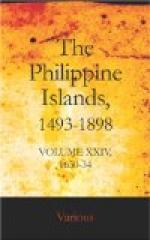Those who entered [port] alive were:
1. Father Fray Francisco de Azuara, from Valencia, lecturer in theology.
2. Father Fray Pedro de Quesada, lecturer in arts, from Castilla.
3. Father Fray Luis de Villerias, a creole, a debater in the university. [72]
4. Father Fray Bartolome de Esterlik, a preacher, an Irishman. [73]
5. Father Fray Dionisio Suarez, chorister.
6. Father Fray Juan de Prado, from Castilla, a preacher.
7. Father Fray Justo Ubeda, from Castilla, a priest.
8. Father Fray Alonso Ramos, from Castilla, a priest.
9. Father Fray Francisco de Abendano, from Castilla, a priest.
10. Brother Fray Alonso Quijano, from Castilla, chorister.
11. Brother Fray Diego Tamayo, from Andalucia, chorister.
12. Father Fray Gonzalo de la Palma, from Castilla, chorister.
13. Brother Fray Juan Lozano, from Castilla, chorister.
14. Brother Fray Miguel Dicastis.
15. Father Fray Gaspar de Castilla, a preacher.
16. Brother Fray Agustin de Chauru, from Castilla, chorister. [74]
They were welcomed gladly, although with grief for the great loss that they had sustained. Those religious suffered greatly; for the storms compelled them to disembark between Bacon and Verde Island, which must have cost them dear. Afterward they suffered not a little on land until they reached Manila, where they were well received and feasted. The priests began to labor, and the brothers, after ordination, did the same, since they had come for that purpose.
I, who had obtained by entreaty what I could to buy two ornaments and all that was necessary, returned to my field of labor; so that I left the convent with a house, church, sacristy, and ornaments, better than before; and all that was necessary for the house, more abundantly and fully than before. I also increased its annual income by more than three hundred pesos.
CHAPTER XLI
Continuation of the preceding
Governor Don Fernando de Silva thought that the trade of this country with China was annually decreasing, because of the Chinese pirates, who were now very bold, so that the traders could not leave port without manifest danger to their property and lives. And indeed, if any came, it was to bring rather people than cloth and the other things that the country needed. Besides this, since the Chinese had Portuguese in their country, they could transport their cloth without so much danger and sell it to the Portuguese. The latter brought it from Macan to Manila, and sold it there at whatever price they pleased; for the Spaniards had to export something, as otherwise they could not live. For their other incomes, acquired through encomiendas—I know not how they are valued—do not suffice or enrich, and least of all satisfy.




